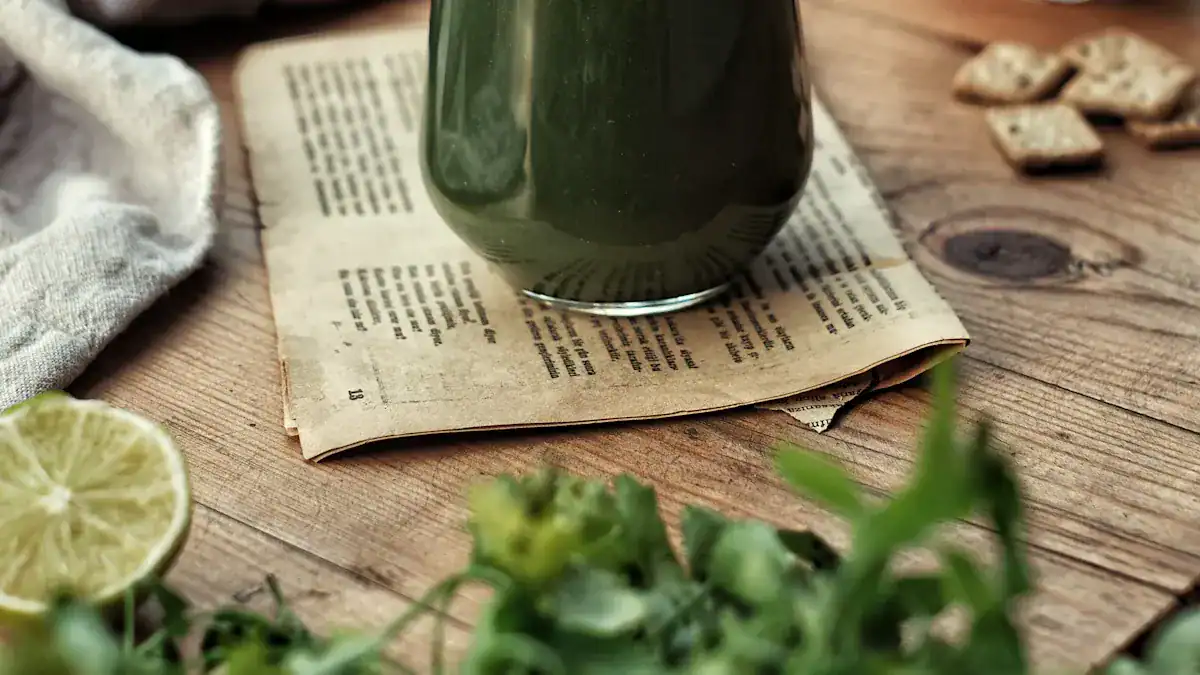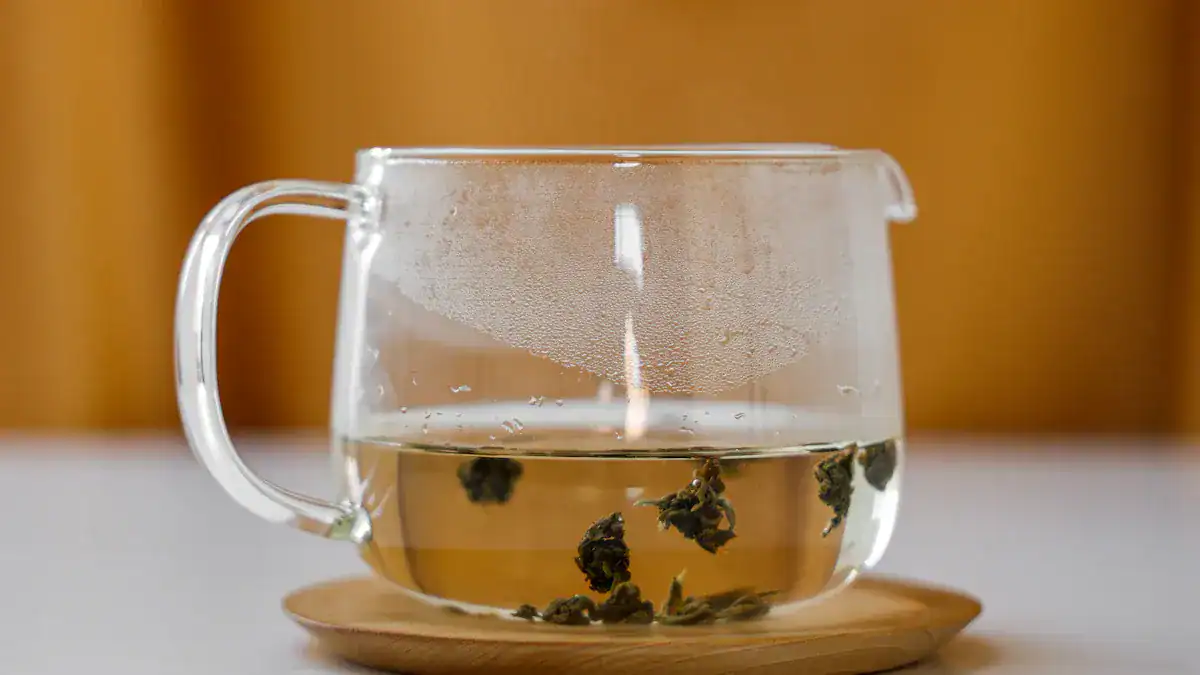
You seek natural health solutions. Your body constantly performs detoxification. Certain herbs can significantly support these natural processes. These herbs that detoxify offer great benefits. This blog explores top detox herbs for a natural body detox. They enhance your well-being and energy. Spring is an ideal time to cleanse. Consider how these detox herbs help your body detoxify.
Key Takeaways
Your body naturally cleanses itself using organs like the liver and kidneys. Herbs help these organs work better.
Dandelion root and milk thistle are good for your liver. They help it process toxins and grow new cells.
Burdock root and nettle leaf help your body remove extra fluids and waste. They support your lymphatic system and kidneys.
Cilantro helps remove heavy metals from your body. Parsley and ginger help with digestion and circulation.
Always talk to a doctor before using new herbs. Start slowly and drink plenty of water to help your body detox.
Understanding Detoxification
What is Detoxification:
Your body constantly works to remove harmful substances. This process is called detoxification. It is a natural function. Several organs play key roles in this vital process. Your liver, kidneys, skin, lungs, and digestive system all work together. Supporting these systems helps your body stay healthy.
Your liver is a major player in detoxification. It processes toxins in three main steps:
Phase I (Biotransformation): Your liver changes toxic substances. It makes them easier to handle. Enzymes like cytochrome P450 help here.
Phase II (Conjugation): Your liver then attaches these changed toxins to other molecules. This makes them water-soluble. They become less harmful.
Phase III (Elimination): Finally, your liver moves these processed toxins. It sends them out of your body through bile or urine.
Your kidneys also perform crucial detoxification tasks. They filter all your blood. They keep what your body needs. They remove waste products.
Your kidneys filter blood. They keep cells in your body.
They reabsorb much of the filtered water. They also reabsorb specific chemicals.
They actively secrete certain chemicals. These chemicals are not removed by filtering.
Your kidneys balance body fluids. They also balance essential electrolytes. These include sodium and potassium.
How Herbs Aid Cleansing:
Herbs do not detoxify your body directly. Instead, detox herbs support your body’s own natural detoxification systems. They help your organs work better. Many detox herbs contain special compounds. These compounds interact with your body’s enzymes. This interaction helps your body cleanse itself more effectively.
For example, certain compounds in detox herbs boost liver function.
Silymarin from Milk Thistle helps your liver. It reduces stress on liver cells. It also helps new liver cells grow.
Curcumin from Turmeric fights harmful free radicals. It also helps control inflammation. This supports your liver’s health.
Cynarin and Silymarin from Artichoke increase bile production. Bile helps digestion and detoxification.
Dandelion Root traditionally boosts liver function. It enhances your body’s detoxification processes.
Top 8 Cleansing Herbs

You can find many detox herbs in nature. These powerful herbs offer unique benefits. They help your body’s natural cleansing processes. Here are eight top detox herbs you can use.
1. Dandelion Root:
Dandelion root is a common weed. It is a mighty ally for your liver health. You can use it for liver support, as a diuretic, and for digestive aid. Dandelion root helps your liver process toxins. It also stimulates bile flow. This aids digestion.
Studies show dandelion has diuretic activity. It helps your body remove excess fluid. One study found dandelion’s diuretic effect similar to a strong medication in mice. Another human study also showed a diuretic effect. Dandelion’s high potassium content may cause this diuretic action. This helps you avoid losing essential minerals.
Dandelion root contains special compounds. These compounds support your liver.
Inulin: This carbohydrate improves gut bacteria. It has anti-inflammatory properties. It helps remove harmful substances. It also increases bile flow.
Taraxacina: This compound has anti-inflammatory and antimicrobial effects. It stimulates appetite. It also helps your liver and kidneys.
Polysaccharides: These substances regulate your immune system. They are antioxidants. They protect your liver. They reduce inflammation in liver fibrosis models. Dandelion root also has other beneficial plant chemicals. These include terpenes, phenolic acids, and flavonoids. They all contribute to its liver-protective, anti-inflammatory, and antioxidant benefits. You can consume dandelion root as a tea or a tincture.
2. Milk Thistle:
Milk thistle is famous for its liver-protecting abilities. It is one of the best detox herbs for your liver. Its main active compound is silymarin. Silymarin helps protect and regenerate liver cells.
Silymarin works in several ways to protect your liver.
It acts as an anti-inflammatory agent. It controls inflammatory signals in your body.
It stops the formation of harmful substances called leukotrienes.
It helps reduce damage to liver cells. It does this by reducing lipid peroxidation.
Silymarin concentrates in liver cells. This makes its protective effects stronger. You can find milk thistle in capsule form. You can also find it as a liquid extract.
3. Burdock Root:
Burdock root is a traditional blood purifier. It helps your body cleanse itself. It supports your lymphatic system. This system removes waste from your tissues. Burdock root also helps your skin stay healthy.
Burdock root strengthens your lymphatic system. It acts as a natural diuretic. It makes your kidneys produce more urine. This helps remove excess fluid and waste from your body. Burdock root helps your lymphatic system release toxins. These toxins can build up in different body areas. This lymphatic stimulation leads to many other benefits. Burdock root also offers anti-inflammatory and antioxidant support. This calms lymphatic inflammation. You can use burdock root in teas or as a supplement.
4. Cilantro:
Cilantro is a popular herb. It helps remove heavy metals from your body. It also supports your digestive health. This makes it one of the useful herbs that detoxify.
Some studies show cilantro helps with heavy metal levels. It can affect levels in the bodies and brains of rodents. A 2014 study found cilantro extract could reduce lead-induced stress in rat brains. A 2021 study showed cilantro protected against lead-caused brain changes in mice. A 2010 study found cilantro reduced lead levels in mouse testes. Another study suggested cilantro leaf extract reduced oxidative stress in kidneys. This was likely due to lower heavy metal concentrations. Experts say more studies are needed. But, there is a basis for cilantro’s ability to chelate heavy metals.
You can take cilantro in different forms.
Cilantro Capsules: You might take 1000 mg once daily.
Cilantro Tincture: You might take one full squeeze (about 0.7 ml) up to three times daily. Some products combine cilantro with chlorella for enhanced effects.
5. Parsley:
Parsley is more than a garnish. It is a powerful diuretic. It supports your kidneys. It also provides many antioxidants.
Parsley’s diuretic effects are well-documented. Studies on rats show parsley seed extract significantly increases urine volume. It does this by affecting kidney enzymes. This leads to more urine output. Compounds like myristicin and apiol in parsley help excrete excess salts and water. Parsley extract also increases the excretion of sodium and potassium. It can even lower blood pressure in rats.
Parsley is rich in antioxidants. These compounds protect your kidney health.
Flavonoids
Phenolic acids
Terpenoids
Essential oils
Polyphenols
Flavonols You can add fresh parsley to your meals. You can also drink parsley tea.
6. Ginger:
Ginger is a well-known spice. It has strong anti-inflammatory properties. It aids digestion. It also improves circulation.
Ginger’s anti-inflammatory action helps your digestive system. It can help control inflammation in conditions like ulcerative colitis and Crohn’s disease. It promotes gastric motility. This helps food move through your digestive tract. Ginger stimulates digestive juices. It relieves discomfort. It manages indigestion. It may even protect against colorectal cancer. It can prevent ulcers in your digestive tract.
Ginger also benefits your circulation. Gingerol is a key active compound. It is responsible for many of ginger’s benefits. Ginger acts as a vasodilator. This means it expands blood vessels. This improves circulation and blood pressure. Other compounds like shogaols, gingerols, and zingerone are antioxidants. Terpenoids, flavonoids, and volatile oils also contribute. These help with anti-inflammatory effects. They indirectly support circulatory health. You can drink ginger tea. You can also add fresh ginger to your cooking.
7. Turmeric:
Turmeric is a vibrant spice. It contains curcumin. Curcumin gives turmeric its powerful anti-inflammatory and antioxidant properties. It supports your liver health.
Clinical trials show curcumin reduces inflammatory mediators. One study showed 80 mg of curcumin significantly improved markers of inflammation. Many studies confirm curcumin’s anti-inflammatory effects. It helps with inflammatory bowel disease, arthritis, and psoriasis. It also helps with depression, atherosclerosis, and even COVID-19. These studies consistently show curcumin reduces inflammatory signals.
Curcumin specifically supports your liver function.
Antioxidant Activity: Curcumin fights free radicals. It reduces damage to fats in your body.
Anti-inflammatory Properties: It stops a key factor called NF-κB. This factor triggers inflammation in chronic illnesses.
Inhibition of Liver Fibrosis: Curcumin prevents liver damage progression. It stops the activation of liver cells involved in scarring.
Regulation of Extracellular Matrix: Curcumin helps break down scar tissue components.
PPAR-c Induction: It helps reduce liver scarring. Curcumin also has anti-diabetic effects. These indirectly benefit your liver. Studies show curcumin supplementation can reduce liver damage markers. These include ALT and AST levels. You can use turmeric in cooking. You can also take it as a supplement. It is one of the best herbs that detoxify.
8. Nettle Leaf:
Nettle leaf is a nutrient-rich herb. It has diuretic effects. It supports your kidneys. It also provides many essential nutrients.
Nettle leaf has diuretic activity. It helps your body remove excess water. This means it can have an additive effect with other diuretics. Research supports this traditional use. A 2000 study showed nettle extract increased urine production and sodium excretion in rats. This effect was similar to a strong diuretic medication. It also lowered arterial blood pressure. Nettle leaf is rich in vitamins and minerals. These include iron, calcium, and vitamins A, C, and K. You can drink nettle leaf tea. You can also find it in capsule form.
Incorporating Detox Herbs

You now understand the power of various detox herbs. You can easily integrate these natural allies into your daily routine. This section provides practical ways to use them.
Teas and Infusions:
Making teas and infusions is a simple way to consume detox herbs. You can brew many herbs, like dandelion root or nettle leaf. For optimal results, steep your tea correctly. Use water heated to 208–212°F. Steep your herbs for 5–7 minutes. Some prefer a slightly lower temperature of 200°F, steeping for the same duration. This method extracts the beneficial compounds effectively. You can enjoy these teas daily to support your body’s cleansing processes.
Tinctures and Supplements:
Tinctures offer a concentrated form of detox herbs. You can find them as liquid extracts. Always follow the dosage instructions on the product label. When choosing tinctures or herbal supplements, prioritize quality. Look for reputable brands that provide third-party testing. This ensures purity and potency. Consult a healthcare professional for personalized guidance on dosage and product selection.
Culinary Uses:
You can easily add detox herbs to your meals. This integrates them into your diet naturally. Try a Roasted Acorn Squash with Chile-Lime Vinaigrette; it features cilantro. Roasted Cabbage Wedges, seasoned with fennel or caraway seeds, offer another option. You can blend an Almond Antioxidant Smoothie with various berries, almond milk, and honey. A Ginger Cucumber Juice includes cucumber, parsley, and ginger. For a refreshing drink, make a Coconut-Lime Detox Drink with baby spinach and lime juice. These culinary uses make consuming detox herbs delicious and simple.
Important Precautions
You embark on a journey with natural remedies. You must approach it with care. These powerful detox herbs support your body. However, you should always prioritize your safety.
Consult a Healthcare Professional:
You should always talk to a healthcare professional. Do this before you start using any new detox herbs. This is especially true if you have existing health conditions. It is also important if you take medications. Herbs can interact with your medicines. For example, St. John’s Wort can reduce the effectiveness of many drugs. These include antidepressants and oral contraceptives. Grapefruit can increase drug concentrations. This leads to serious side effects. Some herbs are not safe for certain conditions. Licorice root is not good for high blood pressure. Kava is not safe for liver disease. Your doctor understands your health history. They can guide you safely.
Start Slowly and Listen to Your Body:
You should introduce new herbs slowly. This allows your body to adjust. You can monitor for any adverse reactions. Common reactions include headaches or stomach upset. You might also experience skin irritation or sleep changes. These symptoms usually go away quickly. Sometimes, people call these a “healing crisis.” This means your body is adjusting. If you experience severe or persistent symptoms, stop using the herb. Then, you should consult your healthcare provider.
Hydration and Diet:
You must support your body’s natural detoxification processes. Drink enough water. You should aim for about eight 8-ounce glasses of water daily. This is about 64 ounces. This amount can change based on your activity level or climate. Water helps your body flush out toxins. You also need a healthy diet. Certain foods enhance detoxification. Green tea extracts and broccoli contain compounds. These compounds activate enzymes. These enzymes help your body process toxins. Vitamins like A, C, and E are also important. Minerals like zinc and selenium help your body’s natural cleansing.
These 8 herbs that detoxify powerfully support your body’s natural detoxification pathways. You can experience improved energy, better digestion, and enhanced overall health. These natural remedies help your body cleanse itself. Thoughtfully integrate these herbs that detoxify into your lifestyle. Always seek personalized guidance from a healthcare professional. This ensures safe and effective use as you cleanse your body and support your body’s detoxification process. This aids your overall detoxification.
FAQ
What is the best way to start using detox herbs?
You should begin with one herb at a time. This helps you see how your body reacts. Start with small doses. You can increase them gradually. Always follow product instructions. You can also consult a healthcare professional for guidance.
What are common signs that detox herbs are working?
You might notice increased energy. Your digestion could improve. You may also experience clearer skin. Some people report better sleep. These are signs your body is cleansing. Remember, individual results vary.
What is the difference between a tea and a tincture?
A tea is an infusion of herbs in hot water. You drink it warm. A tincture is a concentrated liquid extract. It uses alcohol or glycerin. You take tinctures in small drops. Both deliver herb benefits.
What foods should you avoid during a detox?
You should limit processed foods. Avoid sugary drinks and excessive caffeine. Reduce alcohol intake. These items can burden your body’s natural cleansing systems. Focus on whole, fresh foods instead. 🍎🥦🥕

